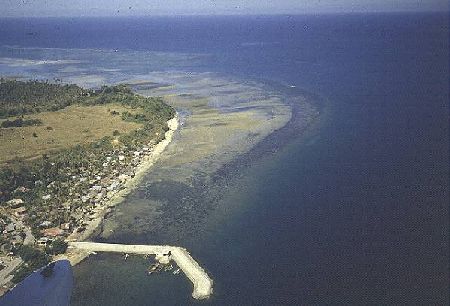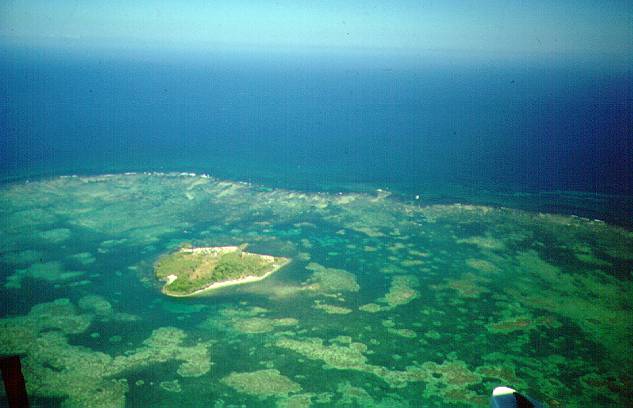Bolinao, Sportfishing Mecca of
Northwestern Luzon
- Aerial photo of Barangays Arnedo, Concordial, Germinal
& Luciente
- with the only fishing port and breakwater in the lower
left-hand corner
- of the photo
-
- Brief History
-
- Bolinao was
founded by Capt. Pedro Lombi in 1575, an island known as "Binabalian" meaning
"old town" with few hundred settlers. However, it was transferred later to
Bolinao mainland due to piratical molestation.
- In 1585, Father Esteban Marinas, the
first Augustinian priest, started the evangelization of the town.
- In 1607, a Roman Catholic Church was
built. This Hispanic church building still remains intact and is presently considered as
one of the oldest churches in the Philippines. It is also one of the landmark and tourist
attractions of Bolinao.
- Bolinao and other western Pangasinan
towns were once part of Zambales. It was the year 1903 when Bolinao and other western
towns were transferred to Pangasinan due to its proximity to the capital town of Lingayen.
-
- Location
-
- Bolinao is situated at the northwestern
tip of Pangasinan and the Lingayen Gulf. It is bounded on the north and west by China Sea,
on the south by the rolling hills and plateaus of Bani, and on the east by Kakiputan
Channel; this body of water separates Bolinao from the only island town of Pangasinan --
Anda -- which is formerly part of Bolinao.
- It is approximately 274 kilometers
north of Manila via Camiling town of Tarlac, 79 kilometers away from the capital town of
Lingayen, 98.5 kms. away from Dagupan City, 115 kms. away from San Carlos City and 125
kms. away from Urdaneta, Pangasinan.
- Regular trips to the municipality are
available with Dagupan Bus Co., Five Star, Victory Liner, Philippine Rabbit, Times
Transit, Byron Express and scores of mini-buses going from Bolinao to Dagupan and
vice-versa. Jeepneys also ply the Alaminos-Bolinao routes while motorized bancas make
trips between the island barangays. A one hour boat ride is also available from San
Fernando, La Union to Bolinao.
-
- Land area and Land use
-
- Bolinao has 23,320 hectares of land
area. It is subdivided into the following:
- 47.13% agricultural, built-up area 2.02%,
infrastructure/institutional 10.84%, pasture land 11.07%, forest area 8.09%, fishpond
2.74%, brushland and open range 16.25% and rivers and creeks 1.85%.
- Aerial photo of Silaqui Island and part of the 14 mile
barrier reef system
- near Santiago Island
-
- Sport Fishing
- Bolinao is also known as the fish
basket of Pangasinan because of the 14 mile barrier reef
located within its area at the mouth of the Lingayen Gulf. As such a variety of fishes are
caught in the waters off Bolinao. Due to the diversity of marine life, Bolinao was chosen
by the University of the Philippines to be the location for the UP Marine Station Institute.
- These include monster 50++ kilo giant trevally (talakitok), blue marlin, sailfish (susay),
barracuda, king
mackerel (tanguigue), needlefish (batalay), yellowfin tuna, skipjack
tuna, dorado (mahi-mahi), grey snapper and bluefish.
- For more information on these gamefish, checkout the gamefish section.
- Due to its natural haven of these
popular game fishes, two sport fishing association, the Philippine Game Fishing Foundation
and the Philippine Sport Fishing Club based in
Manila regularly hold its yearly heavy tackle tournament at
Bolinao.
- Fishing arrangements can be
made through Mang Eddie's fishing charter.
- Tourism
- The location of the town is very
suitable for the tourism business due to its beautiful and scenic beaches, rivers, creeks
and the like.
- The people are friendly and accommodating to
tourists and the town has yet to be commercialized like Boracay.
- Up to now, Bolinao remains a quaint little town
where people can escape the hustle and bustle of city life and enjoy the numerous tourist
spots in and around the area.
- At present, it has several tourist
resorts which cater to both local and foreign visitors. These tourist facilities have room
accommodations available at regular prices and are located nearby the town proper.
- For more information on
contacting these resorts, please contact me at:
- There is also several other resorts
concentrated in the western most tip of Bolinao in Barangay Patar where one can find the
one of best white sand beaches in Pangasinan.
- In addition, there is also a resort
located in Santiago island. Access by land vehicle is possible via a Ferry Boat (accommodates a
maximum of two vehicles aside from passengers) located in Barangay Guiguiwanen, about 10
minutes from the town proper. A ferry ride takes about 5 to 10 minutes only, traversing
the Kakiputan channel about half a kilometer wide. The ferry is open daily from 7 AM to 5
PM with regular hourly trips back and forth.
1-800-ASK-KEEN
(1-800-275-5336) extension: 067559
(For more info on
calling me, visit keen.com)
($1.50 per minute
charge
will apply for US residents only, Callers based from other
countries will pay additional overseas telephone charges)
- Other tourist spots which have
potential for development are Bolinao Falls, Cape Bolinao Lighthouse,
which is the second highest lighthouse in the Philippines, Nanaytayan Cave, Bolinao
National Museum, Guiguiwanen Beach, Balingasay Beach, Abrac Beach, and Fatima Hill.
- Products
-
- Major agricultural crops include rice,
mango, peanuts, shellcraft, salt, coconut, and cashew, while some industries presently
produce charcoal and buri mats. Pacific Farm Inc., located at Barangay Zaragoza, produces
solar salt and Fidel salt in commercial quantity. Bolinao is also noted for a breed of
fighting cocks known as "Bolinao Texas" or "BOLTEX" which is famous
among cockpit aficionados for its cockfighting prowess.
-
- Business
-
- Bolinao has one rural bank, 3 lending investors, scores of
groceries, hardware stores, 3 gasoline stations, 4 pharmacies, and other business
establishments. It also has numerous fish pens and a fish port.
Culled from Guide to Pangasinan Resource,
1995 and the author's personal knowledge


